Level Up Your Knowledge Management in 2025
Stop wasting time searching for information. This listicle reveals the top 10 knowledge base software solutions to streamline your operations and improve customer support in 2025. We'll cover key features, pros, cons, and pricing for leading platforms like Notion, Confluence, and Document360, helping you choose the best knowledge base software for your business. Whether you're a small business or a global enterprise, discover how these tools can empower your team, automate support, and boost productivity.
1. Notion
Notion has quickly become a favorite for individuals and teams seeking a flexible and powerful knowledge base software solution. It's much more than just a note-taking app; it's an all-in-one workspace that seamlessly blends note-taking, knowledge management, project management, and team collaboration into a single platform. This versatility makes it a particularly attractive option for businesses looking to centralize their information and streamline their workflows. Notion allows teams to create highly structured knowledge bases with nested pages, customizable databases, and a variety of content blocks (including text, images, videos, code snippets, and more). This makes it ideal for creating internal wikis, detailed product documentation, comprehensive onboarding materials, and even a full-fledged company intranet. For companies aiming to improve customer support, Notion can be used to build a comprehensive help center or FAQ section accessible to both customers and internal teams.

One of Notion's biggest strengths is its flexibility. Customizable templates and database views allow you to tailor your knowledge base to your specific needs. For example, an e-commerce retailer could use Notion to create a database of frequently asked questions, categorized by product or order issue, and easily searchable for both customers and customer service representatives. Digital agencies can leverage Notion to create client-specific knowledge bases, providing a centralized hub for project documentation, communication, and resources. The nested page structure allows for highly organized knowledge repositories, making it easy to navigate even complex information architectures. Real-time collaboration features facilitate seamless teamwork, allowing multiple users to contribute to and edit the knowledge base simultaneously. Furthermore, powerful integrations with tools like Slack and Google Drive enhance workflow efficiency.
Notion offers a free plan suitable for individuals and small teams getting started. Paid plans, designed for larger teams and businesses, unlock additional features like increased storage, version history, and advanced permissions. The platform is accessible across various devices (web, desktop, and mobile), promoting convenient access to information regardless of location.
Features:
- Customizable templates and database views
- Nested page structure for organized knowledge
- Real-time collaboration
- Powerful integrations (Slack, Google Drive, etc.)
- Cross-platform availability (web, desktop, mobile)
Pros:
- Highly versatile and customizable
- Intuitive drag-and-drop interface
- Excellent for both personal and team knowledge management
- Strong community with template sharing
Cons:
- Can be overwhelming for new users due to its vast feature set.
- Advanced features require a learning curve.
- Limited offline functionality can hinder access in areas with poor internet connectivity.
Implementation Tips:
- Start with a template: Notion offers a wide range of pre-built templates for various use cases, such as product wikis, meeting notes, and design systems. This can significantly speed up the initial setup process.
- Define a clear structure: Plan how you want to organize your knowledge base before diving in. Consider using a hierarchical structure with nested pages and databases to ensure easy navigation.
- Train your team: Ensure everyone on your team understands how to use Notion effectively. This will maximize the platform's benefits and encourage consistent usage.
Notion deserves its place on this list because it offers a compelling blend of power and flexibility. Its ability to serve as an all-in-one workspace, combined with its collaborative features and intuitive interface, makes it a valuable tool for any business looking to build a robust and scalable knowledge base. Visit the Notion website to explore its features and pricing.
2. Confluence
Atlassian's Confluence is a powerful knowledge base software solution designed for enterprise teams and scaling businesses. While it excels at documentation, team collaboration, and creating structured knowledge repositories, its true strength lies in its ability to centralize information and streamline workflows. This makes it particularly valuable for small and medium-sized businesses (SMBs) seeking to offer scalable, 24/7 customer support, e-commerce retailers aiming to improve order management and response times, and customer service teams looking to automate repetitive inquiries and reduce costs. Confluence is equally powerful for larger organizations, allowing global enterprises to manage multilingual, round-the-clock customer engagement, and enabling digital agencies to offer cutting-edge AI-driven support solutions to their clients. By building a comprehensive knowledge base within Confluence, organizations empower both their internal teams and their customers to quickly find the information they need, reducing support tickets and boosting overall efficiency.
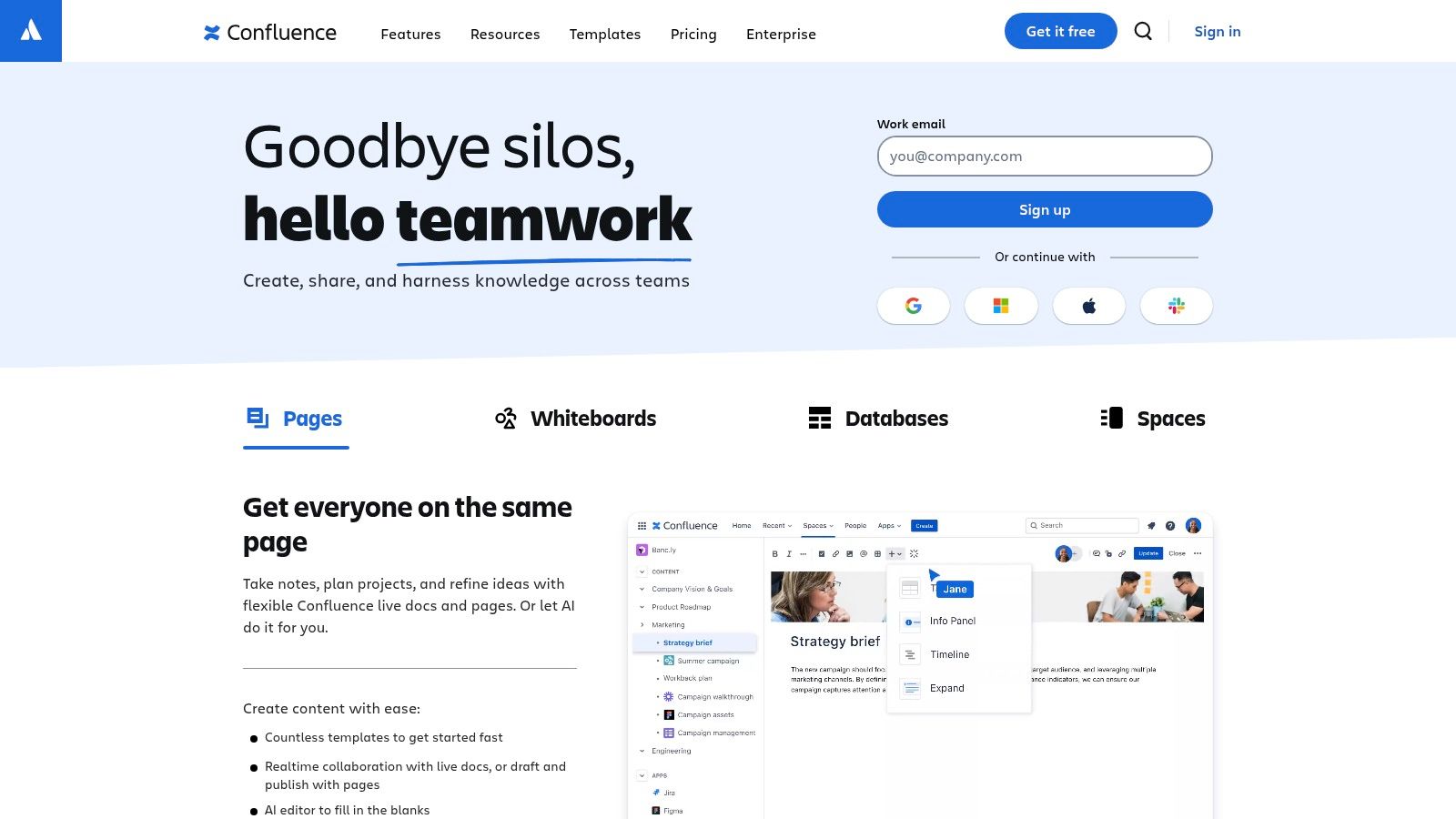
Confluence's robust features contribute significantly to its effectiveness as a knowledge base software platform. Structured page hierarchies combined with rich text editing allow for highly organized and easily digestible content. Granular permissions and access controls ensure that sensitive information is protected and only visible to authorized personnel. Version history and page comparison features make tracking changes and collaborating on documents seamless, while the extensive template library offers a jumpstart for creating various types of knowledge base articles. The advanced search functionality with filters enables users to quickly pinpoint specific information within the vast knowledge repository. Its integration with other Atlassian products, particularly Jira, makes it especially compelling for development and project management teams. For instance, linking Confluence pages to Jira tickets provides developers with instant access to relevant documentation and troubleshooting steps, while customer service teams can leverage integrated knowledge to resolve issues quickly.
Confluence’s pricing varies depending on the number of users and the hosting option (cloud vs. data center). Cloud pricing starts with a free plan for up to 10 users and scales up to enterprise-level plans with custom pricing. While specific technical requirements depend on the chosen hosting option, generally, Confluence requires a modern web browser and sufficient bandwidth for optimal performance.
Compared to other knowledge base software options like Document360 or Help Scout, Confluence offers a more comprehensive approach to knowledge management, extending beyond customer-facing support to encompass internal documentation and project collaboration. However, this broad functionality can also contribute to a steeper learning curve. Learn more about Confluence and explore best practices for effectively managing your knowledge base.
Pros:
- Excellent integration with the Atlassian ecosystem
- Enterprise-grade security and permissions
- Comprehensive documentation capabilities
- Robust version control
Cons:
- Higher price point than some alternatives
- Can be complex to administer, especially for smaller teams
- Interface can feel dated compared to newer, more visually appealing alternatives
Implementation tips:
- Start with a clear plan outlining the structure and purpose of your knowledge base.
- Utilize templates to maintain consistency and speed up content creation.
- Regularly review and update your content to ensure accuracy and relevance.
- Leverage the granular permission settings to control access to sensitive information.
Website: https://www.atlassian.com/software/confluence
3. Document360
Document360 is a robust knowledge base software solution specifically designed for building and managing high-quality documentation, both for internal teams and external customers. This dedicated platform allows businesses to create comprehensive product documentation, detailed technical guides, and self-service help centers, empowering customers to find answers quickly and efficiently. Its category-based architecture and robust version control make it particularly well-suited for complex projects and constantly evolving information.
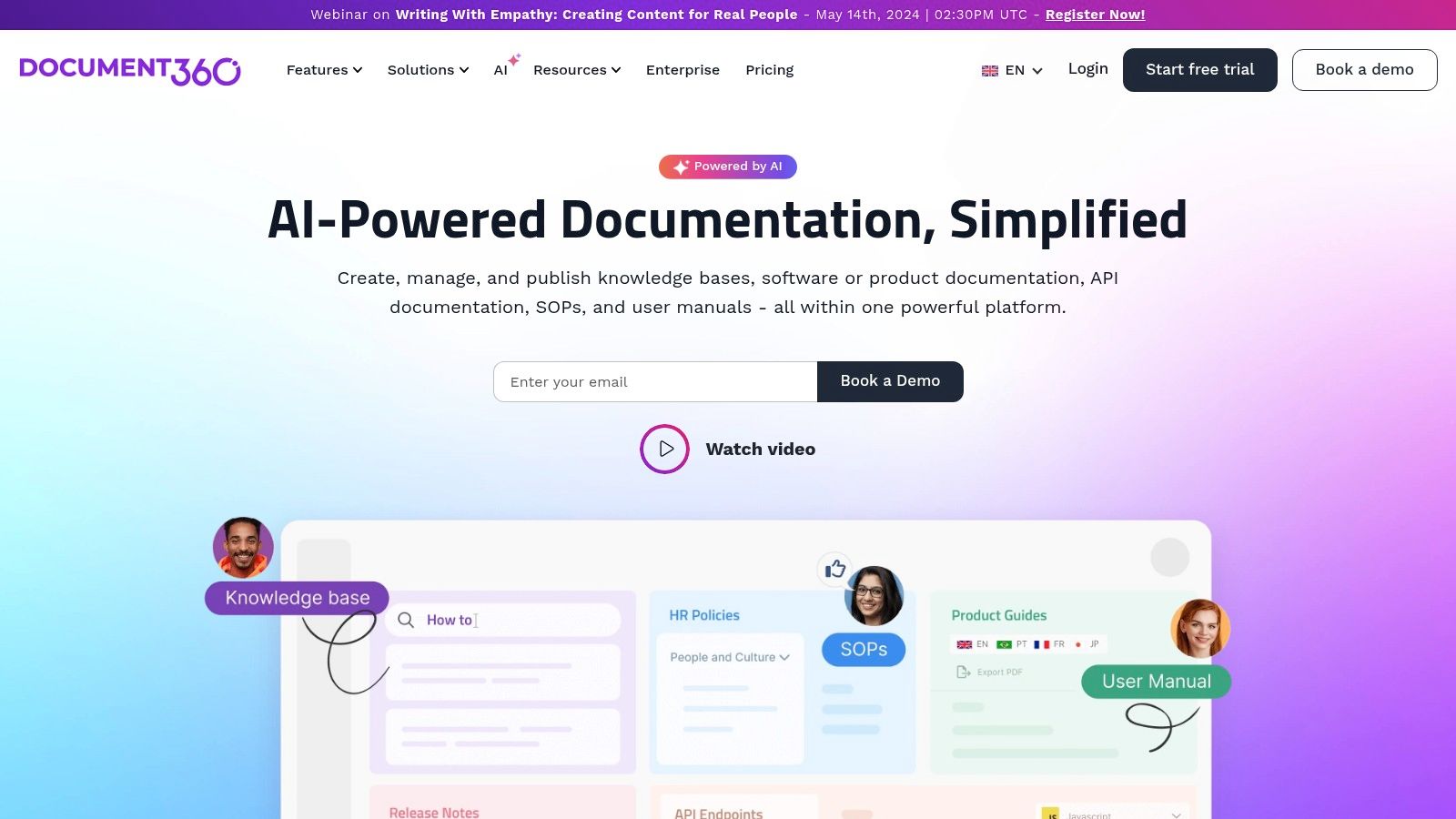
Document360 deserves its place on this list because it prioritizes the creation and management of structured, easily navigable documentation. Unlike more general knowledge base software, Document360 focuses on providing the tools and features necessary for crafting professional-grade documentation, including robust versioning, analytics, and SEO optimization capabilities. This makes it a powerful solution for businesses that prioritize clear, accurate, and easily accessible information as a key part of their customer experience and internal operations.
For example, a growing e-commerce retailer could leverage Document360 to build a comprehensive help center addressing frequently asked questions about shipping, returns, and product information. This empowers customers to self-serve, freeing up customer support agents to handle more complex issues. Simultaneously, internal teams can benefit from a centralized knowledge repository for training materials, technical documentation, and company policies.
Key Features & Benefits:
- Multi-level categorization system: Organize information logically and hierarchically, making it easy for users to find what they need. This is especially helpful for large, complex documentation sets.
- Version control with compare and restore: Track changes, compare different versions, and revert to previous iterations if necessary. This is crucial for maintaining accuracy and managing updates to technical documentation.
- Built-in analytics: Gain insights into content performance, identify knowledge gaps, and optimize documentation based on user behavior. Understand what content is most helpful and what needs improvement.
- Private and public knowledge base options: Choose between a private knowledge base for internal use or a public-facing help center for customers. This flexibility caters to various business needs.
- SEO optimization tools: Improve the visibility of your public-facing knowledge base in search engine results, driving organic traffic and increasing self-service adoption.
Pros:
- Purpose-built for documentation creation and management
- Clean, intuitive user interface for easy navigation and content creation
- Powerful version management capabilities for streamlined collaboration and updates
- Excellent choice for technical documentation due to its structured approach
Cons:
- Less versatile than all-in-one knowledge base platforms that offer project management or other functionalities
- Limited project management features may require integration with other tools for some workflows
- Higher price point for advanced features may not be suitable for all budgets
Pricing: Document360 offers a range of plans based on the number of team members and features required. Detailed pricing information is available on their website.
Technical Requirements: Document360 is a cloud-based platform, accessible through a web browser. No specific hardware or software installations are typically required.
Implementation/Setup Tips: Start by defining the scope of your knowledge base and identifying key content categories. Utilize the multi-level categorization system to organize information logically and leverage the version control feature to manage updates efficiently. Regularly review the built-in analytics to identify areas for improvement and ensure your knowledge base effectively meets user needs.
Website: https://document360.com/
Document360 stands out as a powerful knowledge base software specifically tailored for creating and managing high-quality documentation. While it may not offer the breadth of features found in all-in-one platforms, its focused approach, robust versioning, and analytics make it an excellent choice for businesses prioritizing structured, easily accessible information for both internal teams and customers.
4. Zendesk Guide
Zendesk Guide is a powerful knowledge base software solution tightly integrated with the broader Zendesk customer service platform. This makes it an excellent choice for businesses prioritizing streamlined customer support and self-service options. If you're already using other Zendesk products, Guide becomes even more valuable, acting as a central repository of information accessible to both customers and internal teams. This tight integration allows agents to quickly access relevant articles while addressing customer inquiries, leading to faster resolution times and improved customer satisfaction. For those looking to understand the broader landscape of knowledge base and help desk software, Learn more about Zendesk Guide for a detailed comparison.
This knowledge base software empowers businesses to create comprehensive self-service content, build internal knowledge bases for employee training and onboarding, and even foster community forums for peer-to-peer support. Its robust feature set caters to diverse needs, making it a versatile option for various use cases. Whether you're a small e-commerce retailer aiming to improve order management and response times, a customer service team seeking to automate repetitive inquiries, or a global enterprise needing multilingual customer engagement, Zendesk Guide offers a scalable solution.
Key Features and Benefits:
- AI-Powered Content Suggestions with Answer Bot: Leverage the power of AI to proactively suggest relevant articles to customers as they type their questions, deflecting tickets and empowering self-service.
- Theme Customization and Branding: Maintain a consistent brand experience by customizing the look and feel of your knowledge base to match your website and overall brand identity.
- Content Management Workflows with Approval Processes: Ensure content accuracy and consistency with streamlined workflows that include approval processes before publishing. This is crucial for maintaining quality and managing updates across larger teams.
- Multi-language Support: Cater to a global audience and provide localized support with multi-language capabilities, making it ideal for international businesses.
- Customer Feedback Collection: Gather valuable insights directly from your customers through feedback mechanisms, allowing you to continuously improve your knowledge base content and identify areas for improvement.
- Strong Search Capabilities: Empower customers and agents to quickly find the information they need with robust search functionality that indexes and retrieves relevant articles efficiently.
- Analytics to Identify Knowledge Gaps: Track article views, search queries, and customer feedback to pinpoint areas where your knowledge base may be lacking, enabling data-driven content creation and optimization.
Pros:
- Seamless integration with the Zendesk support suite creates a unified customer service ecosystem.
- Excellent for customer self-service, reducing support ticket volume and empowering customers to find answers independently.
- Strong search and AI-powered suggestions make it easy for customers to locate relevant information.
- Analytics provide valuable insights for optimizing knowledge base content and identifying gaps.
Cons:
- While usable as a standalone product, Zendesk Guide provides the most value when used in conjunction with other Zendesk products.
- It may be less flexible and customizable than some dedicated knowledge base solutions for non-support use cases, like internal documentation.
- Pricing can be a significant investment for smaller teams with limited budgets.
(Pricing and technical requirements information would be inserted here if available)
Implementation/Setup Tips:
- Begin by identifying your key knowledge gaps and prioritize content creation around those areas.
- Leverage the theme customization options to ensure a consistent brand experience.
- Integrate Answer Bot to proactively offer solutions and deflect support tickets.
- Regularly review analytics to identify areas for improvement and optimize your knowledge base content.
Zendesk Guide deserves its place on this list due to its powerful integration with the Zendesk ecosystem, robust features, and focus on customer self-service. While it might be a more substantial investment for smaller businesses, its scalability and comprehensive functionalities make it a valuable asset for growing companies and enterprises seeking to streamline their customer support and empower their customers with readily accessible information. Visit the Zendesk Guide website to learn more and explore its capabilities.
5. GitBook
GitBook stands out as a modern documentation platform that effectively bridges the gap between technical documentation and knowledge sharing. It’s especially popular with developer teams due to its clean, structured approach and robust version control powered by Git. This makes it a powerful knowledge base software solution for creating and managing internal documentation, API specifications, and even public-facing help centers. Imagine centralizing all your technical knowledge in a single, easily searchable repository, accessible to both your internal team and, if you choose, your customers. This is the power GitBook brings to the table.
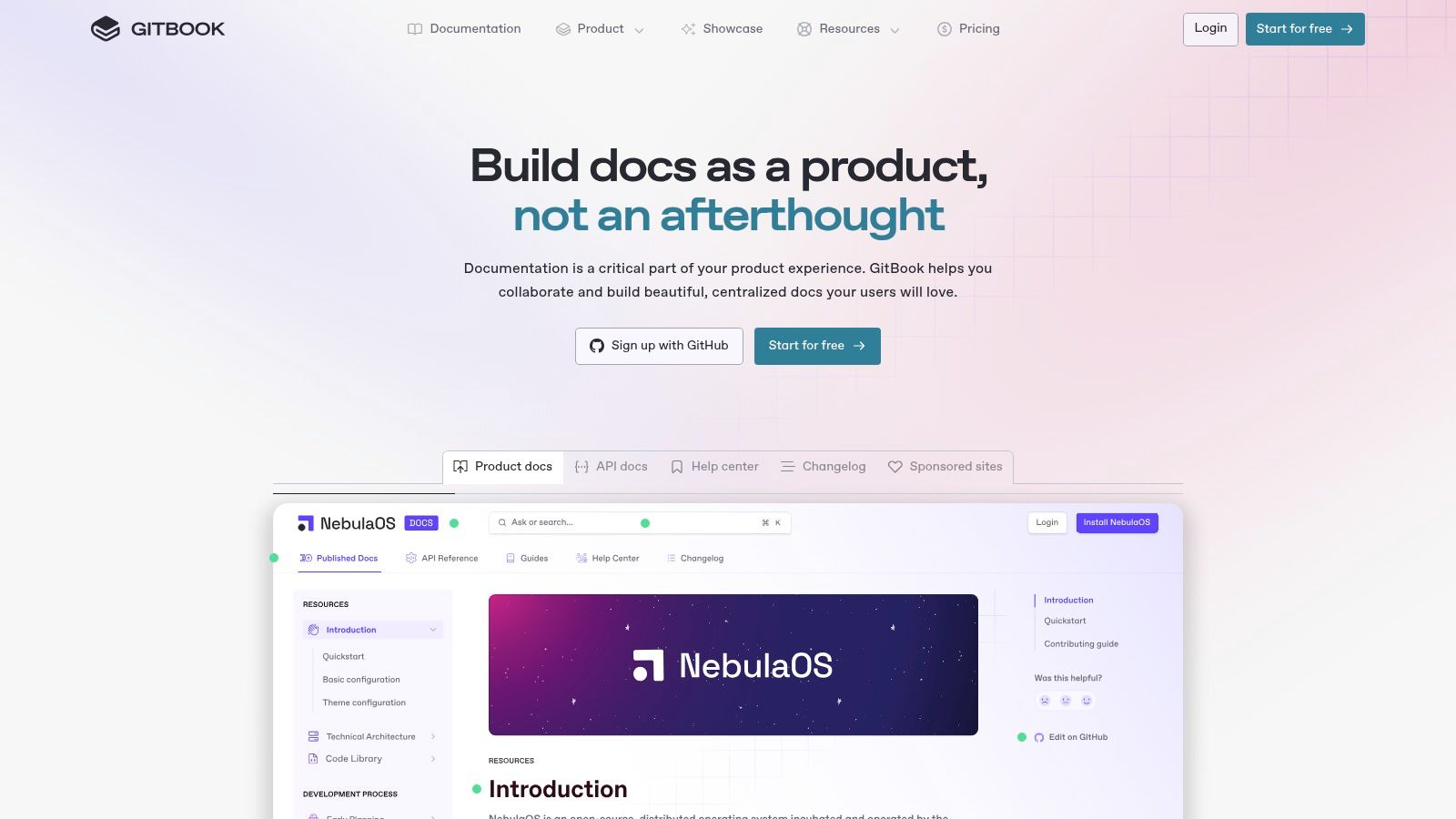
GitBook’s markdown support and seamless GitHub integration make it particularly well-suited for technical teams and open-source projects. For example, software development teams can use GitBook to document code, track changes, and collaborate on API specifications. Its version control features ensure that everyone is working with the most up-to-date information, minimizing confusion and streamlining workflows. While less suited for non-technical teams due to its developer-centric features, it's a powerful tool for those who need a robust, version-controlled knowledge base. E-commerce retailers with in-house development teams could leverage GitBook for internal documentation on platform integrations, APIs, and troubleshooting guides. Similarly, digital agencies building complex technical solutions for their clients can use GitBook to document project specifications and create comprehensive knowledge bases for client onboarding and support.
Key features of GitBook include Git-based version control, support for both Markdown and rich text formatting, developer-friendly documentation tools, specialized API documentation capabilities, and the ability to customize domains and branding. These features combine to provide a powerful and versatile platform for knowledge management. For a deeper dive into selecting the right knowledge base software, Learn more about GitBook.
Pros:
- Excellent for technical documentation: GitBook shines in its ability to handle complex technical information with ease.
- Clean, modern interface: The user-friendly interface allows for easy navigation and content creation.
- Strong version control: Git integration ensures that all changes are tracked and easily reversible.
- Good free tier for open source projects: This makes it accessible to a wide range of users.
Cons:
- Less suited for non-technical teams: The platform's focus on developers might be challenging for teams without technical expertise.
- Limited advanced customization: While basic branding is possible, more advanced customization options are limited.
- Collaborative editing can be improved: While collaborative features exist, there is room for improvement in this area.
Pricing: GitBook offers various pricing plans, including a free tier for open-source projects and paid plans for teams and businesses with additional features and support. Specific pricing details are available on their website.
Technical Requirements: GitBook is a cloud-based platform, so the primary requirement is a stable internet connection and a web browser. For teams leveraging the GitHub integration, familiarity with Git is beneficial.
Website: https://www.gitbook.com/
GitBook earns its place on this list due to its powerful version control, developer-friendly features, and clean, modern interface. It’s a valuable tool for any organization, from small startups to global enterprises, that relies heavily on technical documentation and needs a robust, scalable solution for managing their knowledge base. While not ideal for non-technical teams, its strengths lie in its ability to empower technical teams to create, maintain, and share complex information efficiently. This focus makes it particularly relevant for software development companies, digital agencies, and any business with a strong technical core seeking a knowledge base software tailored to their specific needs.
6. Helpjuice
Helpjuice is a premium knowledge base software solution designed to empower both internal teams and customer-facing operations. Its strength lies in providing a comprehensive platform for knowledge management, making it a popular choice for mid-sized to large companies seeking a robust solution with minimal technical overhead. Whether you're looking to streamline internal communications, create a self-service customer support portal, or improve overall knowledge sharing, Helpjuice offers the tools to achieve these goals. Its focus on advanced analytics and extensive customization options further distinguishes it from other knowledge base software options.
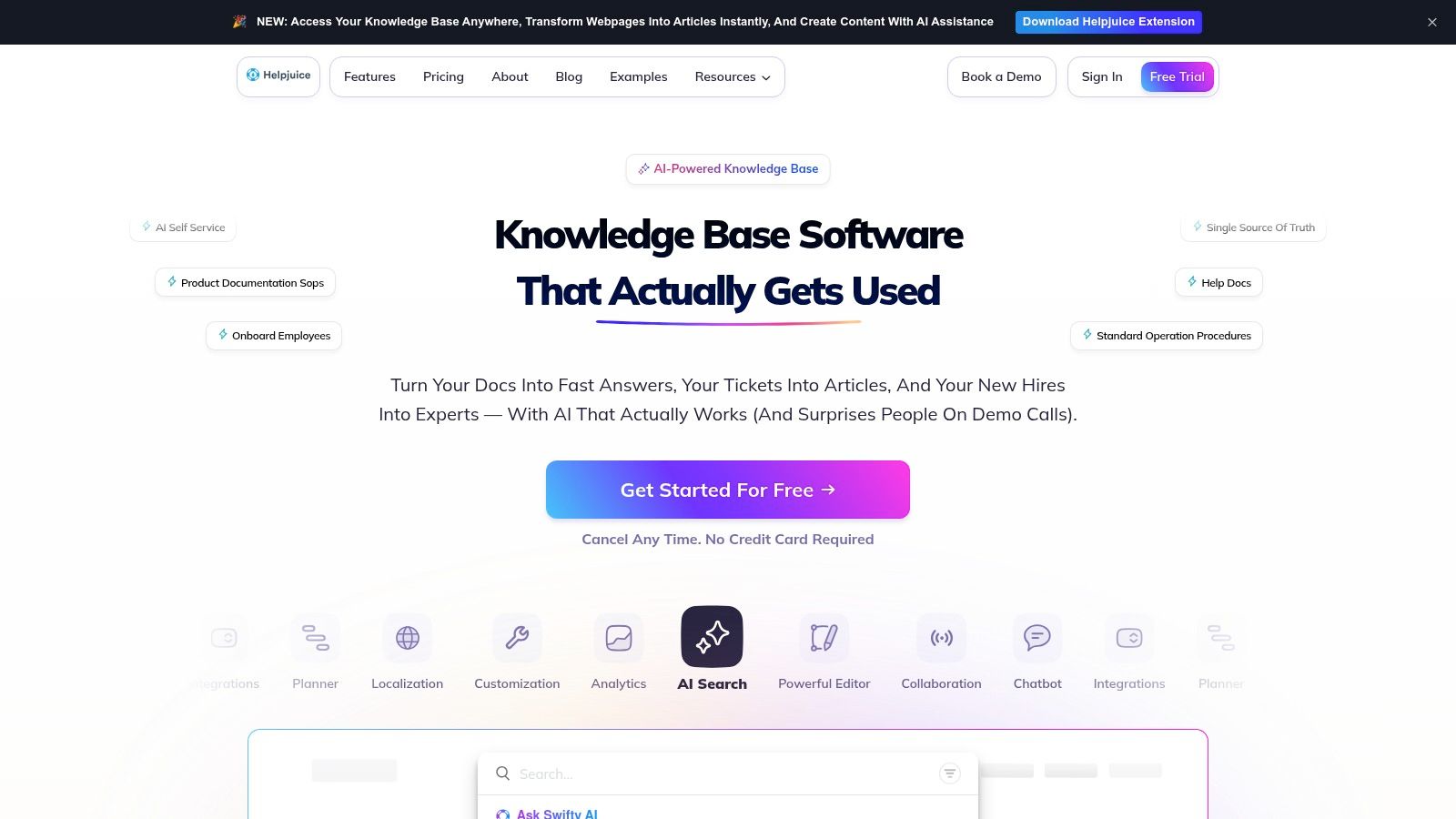
For e-commerce retailers dealing with high volumes of order inquiries and customer service requests, Helpjuice can drastically improve response times and customer satisfaction. By building a comprehensive knowledge base addressing common questions about shipping, returns, and product information, retailers can empower customers to find answers instantly, freeing up customer service teams to focus on more complex issues. Similarly, digital agencies can leverage Helpjuice to create AI-driven support solutions for their clients, offering 24/7 self-service options that scale efficiently. Global enterprises will appreciate the multilingual capabilities of Helpjuice, allowing them to create knowledge bases tailored to different regions and languages, ensuring consistent customer engagement around the clock.
Helpjuice’s powerful search, equipped with autocomplete and analytics, ensures quick and accurate information retrieval. Granular user permissions allow administrators to control access to specific content, safeguarding sensitive internal knowledge. The platform also boasts extensive customization options, allowing businesses to tailor the look and feel of their knowledge base to match their brand identity. Content creation is streamlined with built-in workflow and approval processes. Furthermore, advanced analytics and reporting provide valuable insights into knowledge base usage, enabling continuous improvement and optimization.
Features:
- Powerful search with autocomplete and analytics
- Granular user permissions
- Extensive customization options
- Content workflow with approval processes
- Advanced analytics and reporting
Pros:
- Extremely robust search capabilities
- Excellent content organization tools
- Comprehensive analytics
- Strong customer support
Cons:
- Higher price point compared to some competitors
- Initial setup can be slightly complex for new users
- Some advanced features have a learning curve
Pricing: Helpjuice offers a range of pricing plans based on the number of users and features required. Contact their sales team for specific pricing information.
Technical Requirements: Helpjuice is a cloud-based solution, so there are no specific hardware or software requirements beyond a web browser and internet connection.
Implementation Tips:
- Begin by identifying key knowledge gaps within your organization or customer base.
- Structure your knowledge base logically with clear categories and subcategories.
- Utilize Helpjuice's analytics to track article performance and identify areas for improvement.
- Leverage the customization options to ensure your knowledge base aligns with your brand.
Helpjuice earns its place on this list due to its comprehensive features, powerful search capabilities, and focus on providing a scalable solution for businesses of all sizes. While the initial investment might be higher than some other options, the long-term benefits of streamlined knowledge management and improved customer satisfaction make it a worthwhile investment. Learn more and explore their offerings at https://helpjuice.com/. For businesses seeking a robust and scalable knowledge base software solution, Helpjuice is a strong contender.
7. Tettra
Tettra is a knowledge base software solution specifically designed for teams heavily reliant on Slack and Microsoft Teams. It shines in its ability to capture often-lost "tribal knowledge" within organizations and make it readily available through deep integration with these popular communication platforms. This simplified approach to knowledge capture and sharing significantly reduces friction, making it easier for teams to document and access crucial information. Imagine effortlessly turning a quick Slack exchange about a troubleshooting process into a documented solution accessible to everyone. This is the power Tettra brings to the table, making it an invaluable tool for streamlined knowledge management.
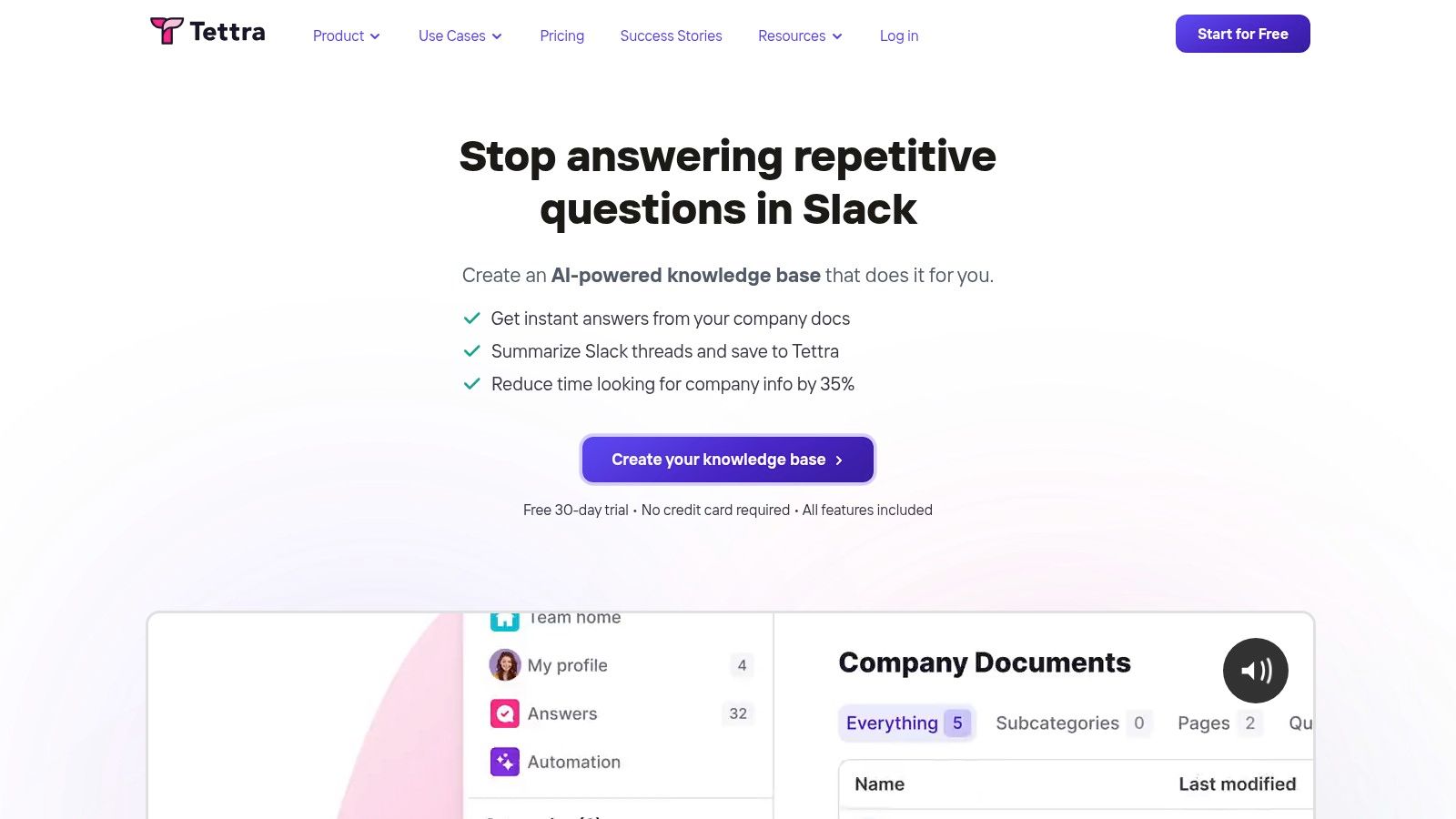
For businesses deeply embedded in the Slack or Microsoft Teams ecosystem, Tettra offers a seamless knowledge management experience. Customer support teams can quickly answer common queries by pulling information directly from the knowledge base within their communication platform, improving response times and customer satisfaction. E-commerce retailers can utilize Tettra to document order fulfillment procedures, troubleshooting guides, and other crucial operational knowledge, enabling efficient scaling and 24/7 support. Digital agencies can leverage Tettra's integration to offer AI-driven support solutions to their clients, providing a valuable add-on service. Even global enterprises can benefit from Tettra’s capabilities, ensuring consistent information dissemination across geographically dispersed teams.
Tettra's key features include AI-powered suggestions for potential knowledge gaps, helping you identify areas needing documentation. Its deep Slack and Microsoft Teams integration allows for direct access to the knowledge base without leaving the communication platform. The simple Q&A format option enables quick creation of easily digestible knowledge articles, while verification and review workflows ensure accuracy and maintain quality. Smart search functionality allows users to quickly find the information they need.
Pros:
- Excellent for Slack/Teams-centric companies: Tettra shines in environments where these communication platforms are central to daily operations.
- Easy knowledge capture from conversations: Transform everyday conversations into documented knowledge.
- Simple, intuitive interface: Easy to navigate and use, even for non-technical users.
- Good onboarding experience: Getting started with Tettra is straightforward and well-supported.
Cons:
- Less powerful for complex documentation: While ideal for shorter, more concise articles, Tettra might be less suitable for highly technical or lengthy documentation.
- Limited advanced formatting options: Customization options for formatting and styling are less extensive than some other knowledge base software.
- Works best with its integrated platforms: While usable standalone, Tettra's full potential is realized when integrated with Slack or Microsoft Teams.
Pricing: Tettra offers a free plan for small teams and paid plans starting at $99/month, offering additional features and integrations. Contact Tettra directly for specific pricing details for larger enterprises.
Technical Requirements: Tettra is a cloud-based solution, requiring only a web browser and an active Slack or Microsoft Teams account for integration.
Implementation Tips: Begin by identifying key knowledge gaps within your organization. Encourage team members to contribute to the knowledge base directly from Slack or Microsoft Teams conversations. Establish a review process to ensure accuracy and consistency.
Tettra deserves its place on this list because it effectively addresses the challenge of capturing and sharing tribal knowledge within organizations that heavily utilize Slack or Microsoft Teams. Its simple yet powerful approach to knowledge management, coupled with its seamless integrations, makes it a valuable tool for businesses seeking to improve internal communication, boost productivity, and streamline customer support. Learn more and explore Tettra at https://tettra.com/.
8. Guru
Guru stands out as a powerful knowledge base software solution, particularly suited for teams prioritizing contextual knowledge access. It acts as a company wiki and knowledge management platform that makes information readily available within the workflow. This focus on delivering verified information precisely when and where it's needed makes it a top choice for sales enablement, customer support, and other teams reliant on accurate, up-to-date information. This positions Guru as an excellent choice for businesses seeking to streamline operations and enhance customer interactions.
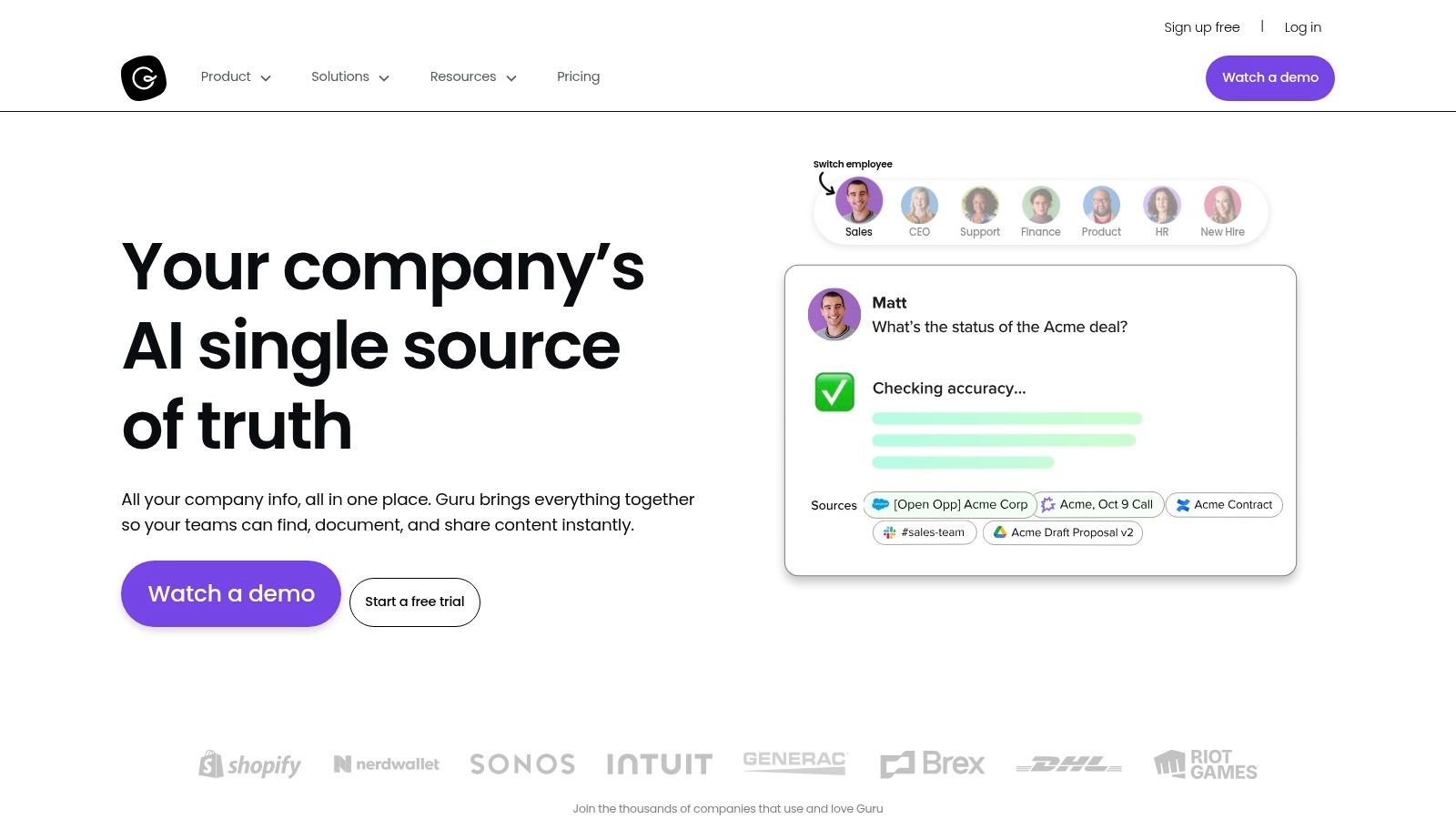
Guru shines in its ability to deliver knowledge within the context of work. Imagine a customer support agent dealing with a complex technical issue. Instead of switching between multiple applications, they can access relevant troubleshooting guides and FAQs directly within their CRM thanks to Guru’s browser extension and integrations. This contextual knowledge delivery minimizes disruptions and empowers teams to respond quickly and efficiently. Similarly, sales teams can access the latest product information and competitive battle cards directly within their sales engagement platforms, enabling them to address customer questions confidently and close deals faster. This real-time access to verified information enhances productivity and improves overall team performance. For e-commerce retailers, Guru can be a game-changer by enabling customer service agents to quickly access order details, shipping information, and return policies, drastically reducing response times and improving customer satisfaction.
Key features contributing to Guru's effectiveness include its knowledge verification workflows, complete with content expiration dates, ensuring that the information accessed is always current. AI-powered content improvement suggestions further enhance the quality and accuracy of the knowledge base. Integrations with popular platforms like Slack, Microsoft Teams, and various CRMs ensure seamless knowledge access within existing workflows. Robust analytics on knowledge usage provides valuable insights into content effectiveness and identifies areas for improvement. These features combine to create a knowledge base solution that’s both powerful and user-friendly.
While Guru’s contextual knowledge delivery and robust verification system are significant advantages, it's worth noting that it is more expensive than some alternatives. Advanced features, such as AI-suggested content improvements and granular analytics, often require higher-tier subscriptions. Additionally, its public-facing documentation features are somewhat limited compared to other knowledge base software options.
Pros:
- Excellent contextual knowledge delivery
- Strong verification system
- User-friendly interface
- Good integration ecosystem
Cons:
- More expensive than some alternatives
- Advanced features require higher tiers
- Limited public-facing documentation features
Website: https://www.getguru.com/
Implementation Tip: Start by identifying key knowledge gaps within your team's workflow. Focus on building a core knowledge base addressing these specific needs before expanding to broader topics. Leverage Guru’s integrations to embed knowledge access directly within the applications your team uses daily.
Guru earns its spot on this list due to its unique focus on contextual knowledge delivery. For businesses prioritizing streamlined workflows and empowering teams with readily accessible, verified information, Guru represents a compelling knowledge base solution. Its targeted approach makes it especially relevant for organizations looking to enhance productivity, improve customer interactions, and foster a culture of knowledge sharing. While the cost may be a factor for some, the benefits derived from its powerful features and seamless integrations often outweigh the investment for teams prioritizing real-time, accurate information access.
9. Nuclino: A Unified Workspace for Streamlined Knowledge Sharing
Nuclino is a versatile knowledge base software solution that distinguishes itself through its unified workspace approach. It seamlessly blends the functionality of a knowledge base, wiki, and real-time collaboration platform into a lightweight and intuitive interface. This makes it an excellent choice for teams prioritizing simplicity, speed, and efficient knowledge sharing. Nuclino excels at providing a distraction-free environment, allowing teams to quickly document processes, share updates, and collaborate on projects with minimal setup time. This makes it a strong contender for businesses looking for an accessible and adaptable knowledge base solution.
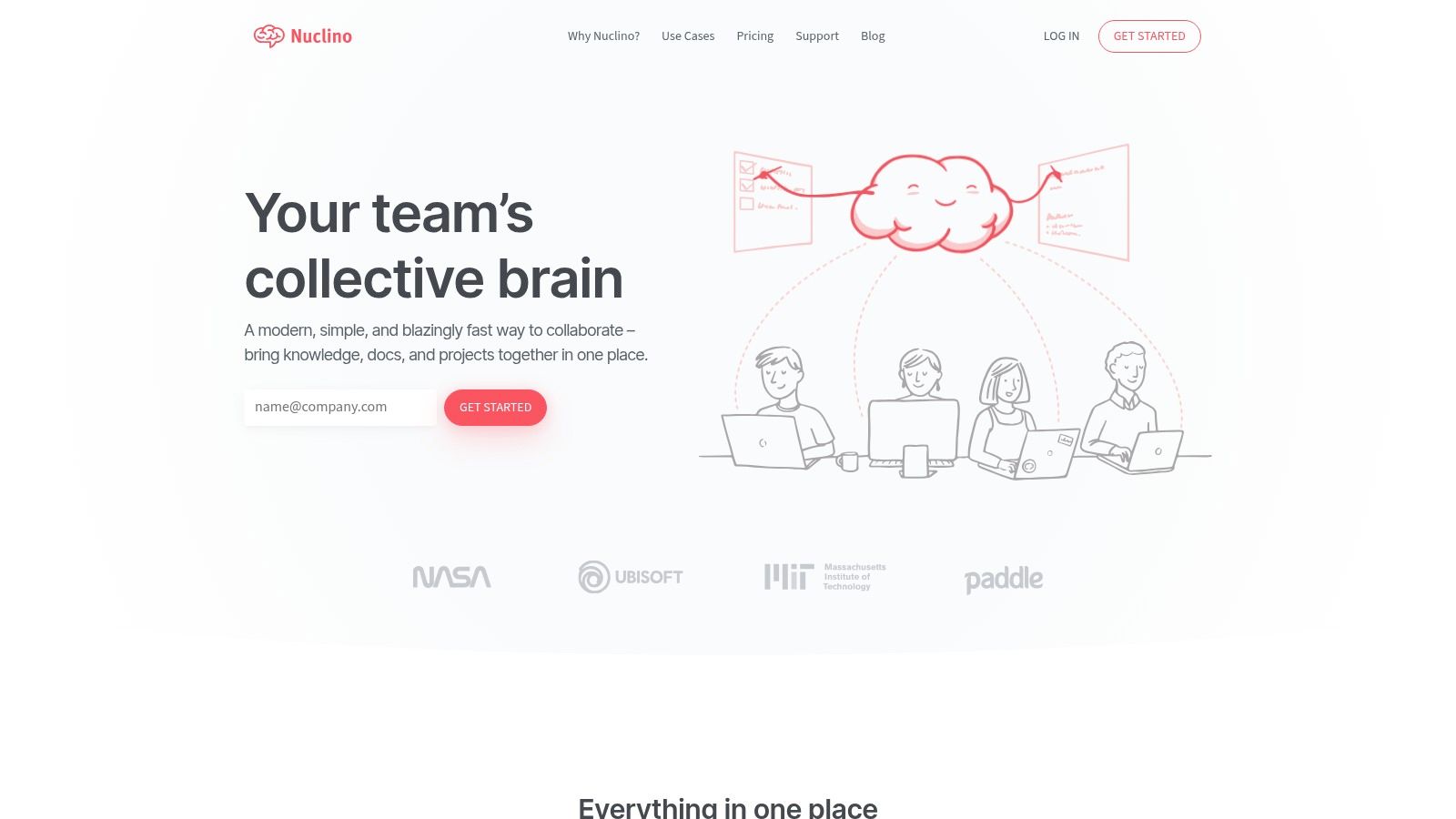
For small to medium-sized businesses (SMBs) seeking to enhance internal communication and knowledge management, Nuclino offers a compelling alternative to more complex knowledge base software. Imagine a customer service team using Nuclino to centralize troubleshooting documentation, enabling 24/7 access to solutions for common customer inquiries. E-commerce retailers can leverage Nuclino to create internal wikis detailing order fulfillment processes, leading to improved order management and faster response times. Digital agencies can even white-label Nuclino to provide clients with a customized knowledge base solution. The real-time collaborative editing feature empowers teams to work together on documentation simultaneously, fostering a more dynamic and efficient workflow.
Nuclino's visual relationship mapping feature is a standout, allowing users to visually link related content, creating a networked knowledge base that’s easy to navigate and understand. Multiple view options (list, board, graph) cater to different preferences and project needs, offering flexibility in how information is organized and presented. The instant search functionality, with live results, makes it easy to find the information needed quickly, a crucial feature for time-sensitive customer support scenarios.
Features:
- Real-time collaborative editing
- Visual relationship mapping between content
- Multiple view options (list, board, graph)
- Instant search with live results
- Simple drag-and-drop interface
Pros:
- Exceptionally clean, distraction-free interface
- Quick setup and onboarding
- Very responsive performance
- Good value for small teams
Cons:
- Fewer advanced features than enterprise solutions (e.g., granular permission controls)
- Limited third-party integrations compared to more established platforms
- Less suitable for complex documentation needs requiring extensive categorization and structured content
Pricing: Nuclino offers a free plan with limited features. Paid plans start at $5/user/month and offer increased storage, advanced features, and priority support.
Technical Requirements: Nuclino is a web-based application accessible through any modern browser. No special software installation is required.
Implementation Tips:
- Start by creating a clear structure for your knowledge base, utilizing the visual relationship mapping feature to link related content.
- Encourage team members to actively contribute and update information to ensure the knowledge base remains current and relevant.
- Take advantage of the different view options to tailor the presentation of information to specific needs.
Nuclino's clean interface, ease of use, and focus on real-time collaboration make it a worthwhile choice for teams looking for a user-friendly knowledge base software solution. While it may lack the advanced features of some enterprise-grade platforms, its simplicity and affordability make it a powerful tool for SMBs, customer service teams, and e-commerce retailers looking to streamline knowledge sharing and improve team collaboration. For those seeking a fast, flexible, and visually appealing knowledge base, Nuclino deserves serious consideration. You can learn more and start a free trial at https://www.nuclino.com/.
10. KnowledgeOwl
KnowledgeOwl is a robust knowledge base software specifically designed for creating and managing comprehensive documentation, catering to both internal teams and external customers. It excels in providing powerful organization and customization options, coupled with granular access control, all within a relatively user-friendly interface. This makes it a popular choice for businesses needing detailed technical documentation, customer-facing support content, or internal wikis. Its focus on documentation features makes it a strong contender for any business looking to streamline information sharing and improve access to crucial knowledge.
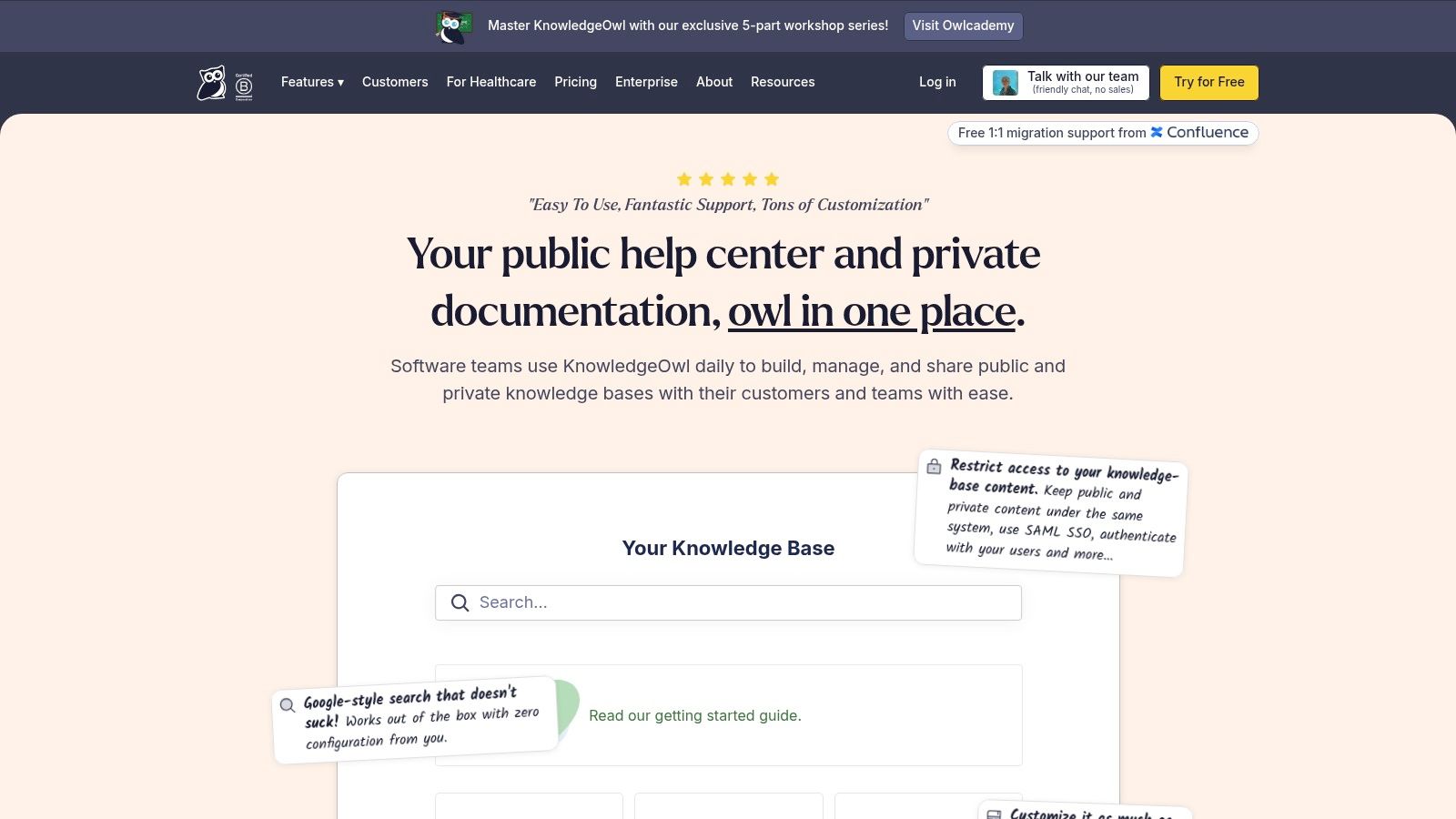
KnowledgeOwl's strength lies in its flexibility. E-commerce retailers can leverage it to build extensive FAQs, troubleshooting guides, and order management documentation, leading to improved customer self-service and reduced support ticket volume. Customer service teams can automate responses to common inquiries, freeing up agents to handle more complex issues and ultimately reduce operational costs. Digital agencies can offer KnowledgeOwl-powered support solutions to their clients, providing an added value proposition and a source of recurring revenue. Even global enterprises benefit from the platform's ability to manage multiple knowledge bases and target content in different languages, ensuring 24/7 customer engagement across various regions. Small and medium-sized businesses also find value in KnowledgeOwl's scalable solution for providing 24/7 customer support without requiring extensive resources.
Key features that contribute to KnowledgeOwl’s effectiveness include flexible categorization and organization (allowing for structured content tailored to specific needs), reader-specific content targeting (delivering personalized information to different user segments), custom themes and white-labeling (for seamless brand integration), comprehensive analytics (to track knowledge base usage and identify areas for improvement), and the ability to manage multiple knowledge bases from a single platform. These functionalities make it a suitable knowledge base software solution for diverse use cases.
Pros:
- Excellent documentation-focused features: KnowledgeOwl is built from the ground up for creating and managing documentation, offering features specifically designed for this purpose.
- Strong access control capabilities: Granular permissions ensure that the right information reaches the right audience, whether it's internal teams or specific customer segments.
- Good balance of power and usability: While offering advanced features, KnowledgeOwl maintains a relatively straightforward interface accessible to users with varying technical skills.
- Responsive customer support: KnowledgeOwl provides helpful and timely support to its users, assisting with setup, configuration, and ongoing usage.
Cons:
- Interface less modern than some competitors: While functional, the user interface might appear less visually appealing compared to some newer knowledge base platforms.
- Limited collaboration features: While multiple users can manage the knowledge base, real-time co-authoring and collaborative editing features are not as robust as some alternatives.
- Setup requires initial configuration time: Setting up a knowledge base in KnowledgeOwl requires some initial investment in planning and configuration to maximize its potential.
While pricing and specific technical requirements are not explicitly listed here and would require a visit to the KnowledgeOwl website for detailed information, it's worth exploring their different plans to determine the best fit for your business needs. Compared to similar tools like Document360 or Helpjuice, KnowledgeOwl prioritizes a structured approach to documentation, making it ideal for complex products or services.
Implementation Tip: Before implementing KnowledgeOwl, clearly define your knowledge base objectives and structure. This upfront planning will save time and ensure a more effective knowledge base in the long run.
For more information and to explore pricing options, visit the KnowledgeOwl website: https://www.knowledgeowl.com/
Knowledge Base Software Comparison
| Product | Core Features & Integrations | User Experience & Quality ★★★★☆ | Value & Pricing 💰 | Target Audience 👥 | Unique Selling Points ✨ |
|---|---|---|---|---|---|
| Notion | Custom templates, nested pages, Slack/Google Drive | Versatile, intuitive, steep learning curve | Moderate; strong community | Teams, personal knowledge users | All-in-one workspace, flexible structure |
| Confluence | Atlassian ecosystem, granular permissions | Enterprise-grade, dated UI, complex admin | Higher price, secure | Enterprises, Atlassian users | Deep Jira integration, powerful search |
| Document360 | Multi-level categories, SEO, analytics | Clean UI, focused on docs | Higher price for advanced | Technical writers, support teams | SEO optimization, detailed version control |
| Zendesk Guide | AI Answer Bot, multi-language, approval workflows | Good search, customer self-service | Costly for small teams | Customer support teams | Zendesk ticketing integration, AI content |
| GitBook | Git versioning, markdown support, API docs | Modern, developer-focused | Good free tier for OSS | Developers, technical teams | GitHub integration, clean modern UI |
| Helpjuice | Advanced search, granular permissions, analytics | Robust, complex setup | High price | Mid-large companies | Extensive customization & reporting |
| Tettra | Slack/Teams integration, Q&A format, smart search | Simple, intuitive, best with Slack/Teams | Moderate | Slack/Teams-centric teams | Deep chat platform integration |
| Guru | Verification workflows, browser extension, AI | User-friendly, contextual delivery | Expensive | Sales, support enablement | In-app knowledge, strong verification |
| Nuclino | Real-time editing, visual maps, multi-view | Clean, distraction-free, quick setup | Good value for small teams | Small teams, lightweight needs | Visual relationship mapping |
| KnowledgeOwl | Flexible categorization, reader targeting, analytics | Balanced power/usability, slow setup | Moderate to high | Technical/documentation teams | White-labeling, multiple KB management |
Choosing the Right Knowledge Base Software
Selecting the right knowledge base software from the myriad of options available, including popular choices like Notion, Confluence, Document360, Zendesk Guide, GitBook, Helpjuice, Tettra, Guru, Nuclino, and KnowledgeOwl, can feel overwhelming. This article has highlighted some of the leading knowledge base software solutions, each with its own strengths and weaknesses. Key takeaways include the importance of considering factors like scalability, ease of use, integration capabilities, and features like robust search functionality and version control. Remember, the ideal solution will depend on your specific business requirements, whether you're a small business aiming for 24/7 customer support, an e-commerce retailer optimizing order management, a customer service team automating inquiries, a digital agency offering AI-driven support, or a global enterprise managing multilingual engagement.
Implementing your chosen knowledge base software effectively requires careful planning. Consider your team's technical expertise, the anticipated volume of content, and the need for ongoing maintenance. Gathering feedback and prioritizing features effectively is key to building a successful knowledge base. For managing feature requests and engaging your users in the development process, consider using feature voting tools to gather valuable insights and prioritize development efforts. Focusing on user experience and ensuring easy access to information will maximize the impact of your knowledge base.
Choosing and implementing the right knowledge base software is an investment in your team, your customers, and your future. By carefully considering your needs and exploring the available options, you can empower your organization with a centralized source of knowledge, leading to improved efficiency, enhanced customer satisfaction, and ultimately, greater success. Ready to take your knowledge management to the next level with AI-powered insights and seamless integrations? Explore FlowGent AI, a platform designed to supercharge your knowledge base software and transform the way you access and leverage information.



